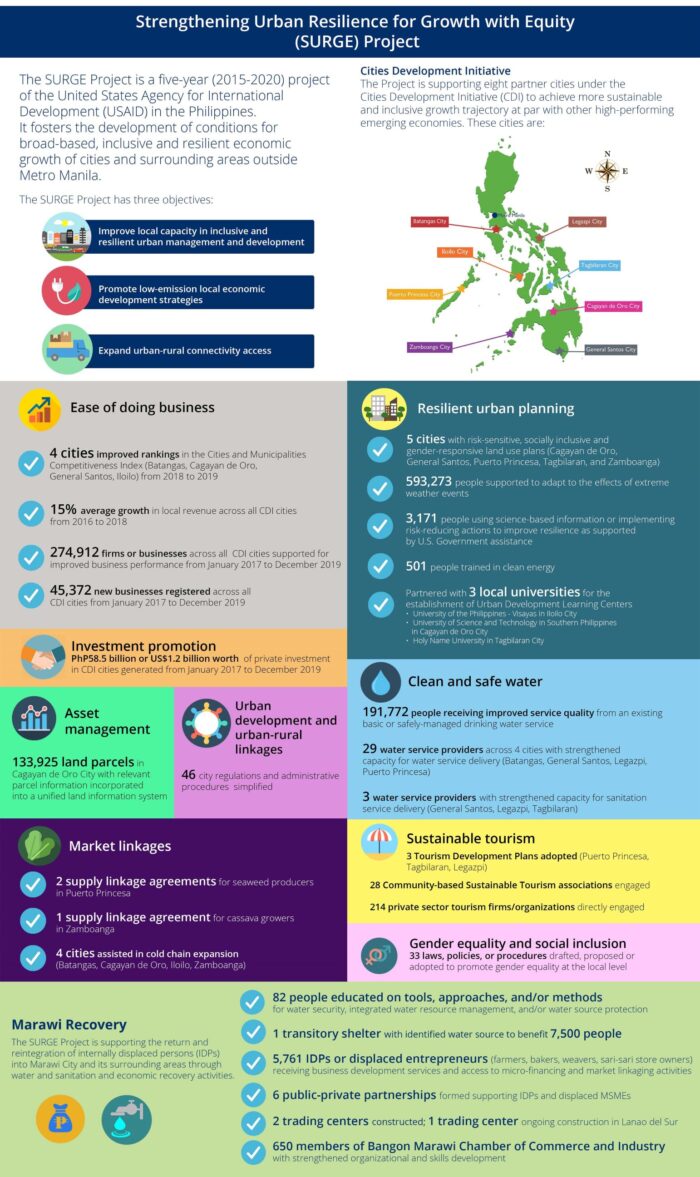With wealth concentrated in Metro Manila and a few other primary cities, secondary and tertiary cities must elevate their role in supportingspreading economic development.
The USAID Strengthening Urban Resilience for Growth with Equity (SURGE) project was a five-year, $47.8 million project, which fostered the development of conditions for broad-based, inclusive and resilient economic growth of cities and surrounding areas outside Metro Manila.
SURGE assisted cities and adjacent areas to plan effectively, guarantee basic public services, reduce business transaction costs, promote competitiveness, support sustainable development, and reduce disaster and climate change risks while ensuring inclusive and sustainable growth.
SURGE was the flagship project of USAID’s Cities Development Initiative (CDI), a crucial component of the broader Partnership for Growth with Equity (PFG). A “whole of government” partnership between the U.S. Government and the Government of the Philippines, the PFG aims to shift the Philippines to a sustained and more inclusive growth trajectory on par with other high‐performing emerging economies.

Activities
Activities under SURGE focused on four key areas:
1) Strengthening local capacity in inclusive and resilient urban development, including the promotion of disaster risk reduction and climate change adaptation, and ensuring access to sustainable water supply and sanitation services
2) Promoting low-emission local economic development strategies
3) Expanding economic connectivity and access between urban and rural areas.
In line with the CDI’s approach of providing a multi-faceted package of assistance, SURGE leveraged and worked with existing USAID projects in economic growth, environment, energy and climate change, health, and education. Under the CDI, USAID works in partnership with the cities of Batangas, Cagayan de Oro, General Santos, Iloilo, Legazpi, Puerto Princesa, Tagbilaran, Zamboanga, and will cover additional cities in the near term.
By the end of SURGE, activities contributed to higher levels of investment and employment for both the CDI cities and adjacent areas.
In the aftermath of the Marawi City siege in 2017, SURGE developed a package of assistance that supported the return and reintegration of internally displaced persons (IDP) in the city through water and sanitation and economic recovery activities. These initiatives aligned with and reinforced the existing strategy of the United States Government of reducing the overall vulnerability of IDPs to violent extremism.
Objectives
- Improve local capacity in inclusive and resilient urban development.
- Promote low-emission local economic development strategies.
- Expand economic connectivity and access between urban and rural areas.
Results
As of 2019, SURGE achieved the following milestones in the CDI cities:
Resilient urban development
- 5 cities with risk-sensitive, socially inclusive land use plans
- 593,273 people supported to adapt to the effects of extreme weather events
- 3,171 people using science-based information to improve resilience
- 501 people trained in clean energy
- Partnered with 3 local universities for the establishment of Urban Development Learning Centers
Clean and safe water and proper sanitation
- 191,772 people receiving improved service quality
- 29 water service providers with strengthened capacity for water service delivery
- 3 water service providers with strengthened capacity for sanitation service delivery
Ease of doing business
- 4 cities improved rankings in the Philippines’ Cities and Municipalities Competitiveness Index
- 15% average growth in local revenues across all CDI cities
- 274,912 businesses supported for improved business performance
- 45,372 news businesses registered
Investment promotion
- PhP58.5 billion or US$1.2 billion worth of private investments in CDI cities
Land and asset management
- 133,925 land parcels incorporated into a unified land information system
Sustainable tourism
- 3 Tourism Development Plans adopted
- 28 community-based sustainable tourism groups engaged
- 214 private sector tourism groups directly engaged
Market linkages
- 3 supply linkage agreements forged for farmers’ groups
- 4 cities assisted in cold chain expansion
Urban development and urban-rural linkages
- 46 city regulations and administrative procedures simplified
Gender equality and social inclusion
- 44 laws, policies, or procedures proposed or adopted to promote gender equality at the local level
In Marawi and Lanao provinces, SURGE achieved the following:
Water and sanitation
- 82 people educated on tools and methods for water security, integrated water resource management, and/or water source protection
- 1 transitory shelter with 7,500 people with identified water source
Livelihood
- 5,761 IDPs or displaced entrepreneurs receiving business development services
- 6 public-private partnerships formed supporting IDPs
- 2 trading centers constructed for displaced entrepreneurs
- 650 members of Bangon Marawi Chamber of Commerce and Industry with strengthened organizational and skills development

